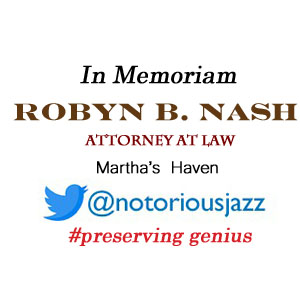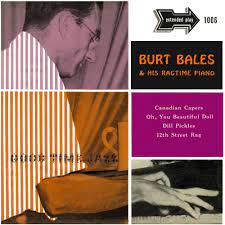
Daily Dose Of Jazz…
Burton Franklin Bales was born on April 20, 1916 in Stevensville, Montana and began to play piano at age twelve. By the 1930s he was in California playing in hotels and nightclubs. He played regularly in San Francisco, California in the 1940s, with Lu Watters’s Yerba Buena Jazz Band until he was drafted in 1943 and only recorded with that group on one brief session with Bunk Johnson.
After he was discharged for myopia he led his own band from 1943 to 1946 before taking an extended residency at San Francisco’s 1018 Club. He played with Turk Murphy (1949–50), Bob Scobey, and Marty Marsala, then played mostly solo between 1954 and 1966 where one of his regular gigs was at Pier 23.
He recorded extensively for Good Time Jazz, Arhoolie, ABC-Paramount, and Euphonic. Stride pianist Burt Bales transitioned on October 26, 1989, in San Francisco.
More Posts: bandleader,history,instrumental,jazz,music,piano
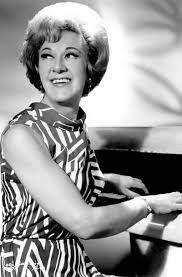
Three Wishes
Marian McPartland was hanging out with the Baroness when she inquired about her three wishes and she responded by telling her:
- “I don’t need three wishes. Just one. But I can’t tell you what it is.”
*Excerpt from Three Wishes: An Intimate Look at Jazz Greats ~ Compiled and Photographed by Pannonica de Koenigswarter
More Posts: baroness,composer,history,instrumental,jazz,music,pannonica,piano,three,wishes
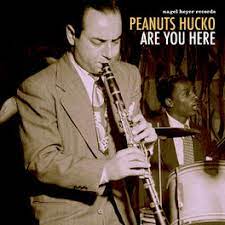
Daily Dose Of jazz…
Peanuts Hucko was born Michael Andrew Hucko in Syracuse, New York on April 7, 1918. He moved to New York City in 1939 where he played tenor saxophone with Will Bradley, Tommy Reynolds, and Joe Marsala until 1940.
After a brief time with Charlie Spivak, he joined the Glenn Miller Army Air Force Band while serving in Europe during World War II. During this time, Peanuts began to concentrate on the clarinet. He was featured in Miller’s hard-driving versions of Stealin’ Apples and Mission to Moscow. Post-war, he played in the bands of Benny Goodman, Ray McKinley, Eddie Condon and Jack Teagarden. From 1950 to 1955, he was busy in New York as a studio musician for CBS and ABC.
He continued working with Goodman and Teagarden, When he visited Tokyo, Japan in 1951 as the lead alto saxophonist in Benny Goodman’s Orchestra, he listened to clarinetist Shoji Suzuki and his Rhythm Aces. With Suzuki and his band, they recorded the song Suzukake No Michi, which broke sales records in Japan. He then joined the Louis Armstrong All-Stars for two years from 1958 to 1960.
Hucko led his own group at Eddie Condon’s Club from 1964 to 1966. He became known for his work with Frank Sinatra as the clarinet soloist on Cole Porter’s What Is This Thing Called Love?, which was featured on Sinatra’s album In the Wee Small Hours. In 1964, he opened his own nightclub Peanuts Hucko’s Navarre, in Denver, Colorado which featured his singer wife Louise Tobin and Ralph Sutton. From 1966, he was featured regularly at Dick Gibson’s Colorado jazz parties where he appeared with the Ten Greats of Jazz, later called the World’s Greatest Jazz Band.
The Seventies saw Peanuts leading the Glenn Miller Orchestra and toured across the U.S. and abroad. He also toured with the Million Airs Orchestra, and appeared with the Lawrence Welk Orchestra. The next decade he toured with his Pied Piper Quintet before going into semi-retirement with his wife in Denton, Texas. He recorded his last session Swing That Music in 1992 featuring Tobin, trumpeter Randy Sandke, and pianist Johnny Varro.
As a composer he wrote or co-wrote See You Again, A Bientot, Peanut Butter, Blintzes Bagel Boogie, Falling Tears, First Friday, Tremont Place, and Sweet Home Suite. Big band clarinetist Peanuts Hucko, who sometimes played saxophone, transitioned in Fort Worth, Texas on June 19, 2003 at the age of 85.
More Posts: bandleader,clarinet,club owner,history,instrumental,jazz,music,saxophone
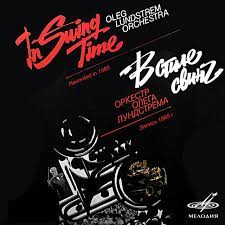
Daily Dose Of Jazz…
Oleg Leonidovich Lundstrem was born April 2, 1916 into a family of musicians in Chita, Transbaikal Oblast. His family moved to Harbin, China when he was five. By 1935, inspired by Duke Ellington’s Dear Old Southland record which he purchased, he joined forces with eight other young Russian amateur musicians and formed the Oleg Lundstrem Orchestra. The following year the band moved to Shanghai, China where they immediately became popular among the public. The band was an important part of Shanghai’s jazz scene until 1947, along with Buck Clayton Orchestra.
After World War II, in 1947 Oleg returned to the Soviet Union and settled in Kazan, where he worked as a violinist in the opera and ballet theatre, while keeping his jazz orchestra as a side act. 1956 saw the Oleg Lundstrem Orchestra moving to Moscow where he was appointed by the Soviet cultural authorities as the orchestra’s art director and conductor.
His orchestra was recognized by the Guinness Book of Records as the oldest continuously existing jazz band in the world, the official name being The State Oleg Lundstrem Chamber Orchestra of Jazz Music.
Composer and conductor Oleg Lundstrem, also spelled Lundstroem or Lundström, transitioned from natural causes at his home on October 14, 2005 in Korolyov, Moscow Oblast at the age of 89.
More Posts: bandleader,composer,conductor,history,instrumental,jazz,music,violin
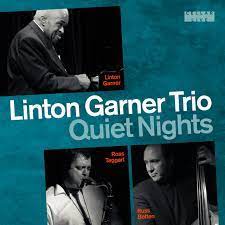
Daily Dose Of Jazz…
Linton Garner was born on March 25, 1915 in Greensboro, North Carolina. As a youngster he wanted to play cornet rather than piano, but due to problems with his teeth, was forced to concentrate on the keyboard. From the age of 8 until 10 he had piano lessons, as did his three sisters, unlike his brother.
He was arranger and pianist with Fletcher Henderson’s band before the Second World War, then spent 1943 to 1946 in the army, where he played both piano and trumpet in different bands. Afterwards he was pianist and arranger for a number of distinguished bands including those of Billy Eckstine and Dizzy Gillespie. He also accompanied Sarah Vaughan, Nat King Cole, Carmen McRae and Della Reese. He also wrote songs, including You’re the One For Me.
Moving to Canada in 1963, by 1974 he was invited by Arni May to Vancouver, British Columbia to accompany him at the opening of the Richmond Inn Hotel. Linton stayed in Vancouver and worked in many venues becoming the resident pianist for seven years at the Four Seasons Hotel.
The 1990s had him playing at the Three Greenhorns in Vancouver. He also sang and played the piano in Rossini’s restaurant in Kitsilano. The Linton Garner Legacy Quartet, featuring drummer Don Fraser, bassist Russ Botten, pianist Ron Johnston, and pianist Miles Black continues to play Garner’s music.
Pianist, trumpet and vocalist Linton Garner, who was Erroll’s older brother, transitioned from kidney failure in Vancouver, at the age of 87 on March 6, 2003.
More Posts: bandleader,history,instrumental,jazz,music,piano,trumpet,vocal


